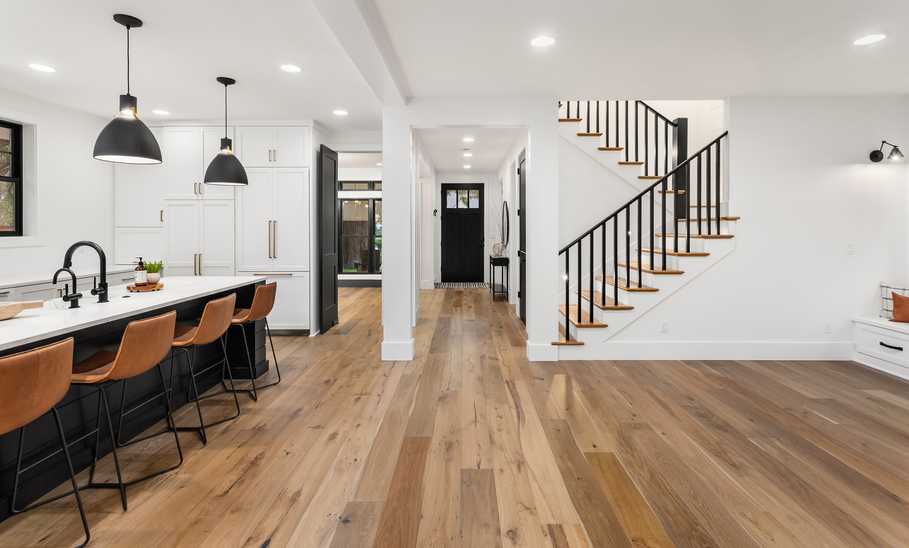How Much Does It Cost to Renovate a House? What to Spend, How to Pay for It

Our evaluations and opinions are not influenced by our advertising relationships, but we may earn a commission from our partners’ links. This content is created by TIME Stamped, under TIME’s direction and produced in accordance with TIME’s editorial guidelines and overseen by TIME’s editorial staff. Learn more about it.
The past few years have changed the way Americans deal with their homes and real estate, in general. Shelter-in-place orders spiked a renewed interest in home renovations to accommodate a new family dynamic of remote work and homeschooling.
Then, a sudden spike in home prices and interest rates caused many would-be homebuyers to reexamine their plans to purchase a home. For many, the best option became home renovation instead.
As this trend continues, it’s very possible that you might be in the same boat—planning to renovate your home. This will naturally bring you to the next phase in your research, which is determining the cost to do so.
If you’d like to get a sense of what it costs to renovate a home in 2024, we’ll break down average costs for different projects and return on investment (ROI) to help you determine if a home improvement project makes sense for your financial goals.
Find the top personal loans lenders
If reselling your home at a profit is a goal, the best approach would be to make renovations that add value to the home. Adding hyper-specific customizations that don’t appeal to a broader home-buying market could provide a poor return on your money or even decrease the market value of your home. With that in mind, your budget should mainly focus on the best bang-for-your-buck renovations.
The cost of renovating a home will depend on your location, the type of materials you use and along with the expertise of the labor. Because of these variations, it’s helpful to look at your renovation costs as a percentage of your home’s value.
If you’re planning on remodeling your entire home, your renovation costs will be substantial. Your return on investment (ROI) will depend on your finishes and the quality of the work, but here’s a general guide that can help you estimate your renovation costs based on the square footage of your home:
| Project | Average cost | Estimated ROI |
|---|---|---|
Kitchen | $75,000 | 57% |
Bathroom | $24,000 | 60% |
Adding a room | $156,000 | 59% |
Garage door replacement | $3,900 | 94% |
In terms of ROI, you should expect to get a minimum 30%-60% return on a complete mid-range renovation or even a single project renovation, like a bathroom remodel. For high-cost-of-living (HCOL) areas, costs could be 10% to 30% higher. Of course, these numbers are subject to many other factors as well, but this is a ballpark of what you can expect.
The first thing you should do is plan for where you’ll focus your renovation efforts. You may want your sauna room installed ASAP. However, that kind of upgrade might not give you the best return on your money.
Start with the end in mind. If your goal is to force appreciation of your residence, thereby increasing the resale value, then you’ll want to focus on the projects that give you the best returns.
Once you are certain about the projects you’ll undertake, it’s time to talk about the quality of your work. If you live in an area where prospective buyers could use your home as a rental property, then you should aim for rental finishes, which can save you tons on your rehab.
It’s ok to add high-end touches, but you don’t want to spend so much that you’ll get diminishing returns on your renovation. Pricey finishes may not be necessary for your area or the taste of the buyer who’d purchase your home.
This is a good time to figure out if you’ll DIY some aspects of your projects or hire professional help. Sometimes, a mixed approach can make sense. Just make sure you won’t get overwhelmed with things to do and delay the completion of your project.
One of the most frustrating things about home renovations is the ever-increasing timeline. Renovations almost always take longer than anticipated due to several factors including:
Once you know the risk factors that can delay your project, it’s wise to make moves to mitigate them. For instance, you can ensure all materials are on site before your work begins. You can book your contractor well before the project’s start date and so on.
Saving for your home renovation is like saving for any other large expense. You can implement one or more strategies to pad your savings accounts. Using a spreadsheet or savings app to support your progress can also be helpful.
Compare top savings accounts
Here are some ideas to get you started.
One of the easy ways to save for your renovation is to divert monies from unnecessary household expenses to your renovation fund. Here are some discretionary expenses you can eliminate or decrease:
You can increase your income by asking for a raise, getting a higher-paying job or taking on side-hustles. Use the extra money to cover your renovation costs.
If you’ve got a strategic exit plan for your house, such as a sales or cash out refinance of your home, then you can borrow from yourself with the anticipation of replacing the funds in the near future.
You may have a savings or retirement account you can temporarily borrow from. This move is not risk-free, so make sure you have a good idea of renovation costs and how your home’s value will support a profitable exit.
A home equity loan or home equity line of credit (HELOC) allows you to borrow against the equity in your home. It’s very similar to a mortgage in that there are closing costs, appraisals and a lien placed against your home to secure the loan.
Some financial products allow you to use loan proceeds for a renovation. Contrary to popular belief, government loans are not available for renovation, but government-backed loans are available to get this done. These include the FHA 203(k), VA loans (construction to permanent) and even USDA loans. The Fannie Mae HomeStyle Renovation loan is another option to fix up your home.
A personal loan is an unsecured loan that you can typically use for many things, such as a home renovation. Because these loans are unsecured, the interest rates can be higher and qualifying for them is somewhat challenging. Eligible borrowers must have good to excellent credit and sufficient income to qualify.
See if you’re pre-qualified for a personal loan offer
You can use a credit card to buy materials for your home renovation and, in some cases, pay your labor costs. Because the interest rate is very high on credit cards, they should only be used if you can pay the balance down quickly. If you use 0% APR credit card like card_name (intro_apr_rate,intro_apr_duration followed by reg_apr,reg_apr_type) , you could avoid paying any interest for many months, though many contractors may charge an extra fee for using a credit card.
The cost of a home renovation can vary based on so many factors, including where you’re located and the kind of materials you’ll be using. To eliminate the uncertainty around costs, you should get estimates from at least three contractors.
Ask for a separate breakdown of both labor and materials and if there are any discounts you might be eligible for. If they’ve got reviews and references, even better. Once you’ve chosen the right person for the job, you can move forward with confidence to improve your home.
Generally speaking, it’s more cost-effective to renovate a home you already have. However, it might be less stressful to buy a home that’s already been renovated.
If you have a cost-effective way to move out of your home during a renovation, it could be a good idea. If not, moving out during construction will create an extra cost, ultimately making your renovation much more expensive.
Generally speaking, it’s best to have your contractor front funds for the first phase of work, which might be demolition or framing. Then, make payments as each phase is completed successfully. It’s not advisable to pay for work upfront or give a deposit.
The information presented here is created by TIME Stamped and overseen by TIME editorial staff. To learn more, see our About Us page.



